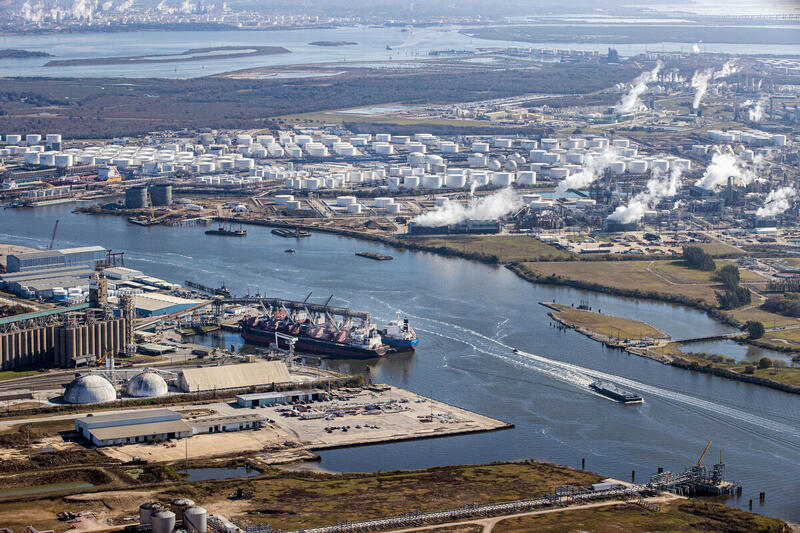The LNG Cargo tags, which Cheniere began issuing in June, are the gas industry’s latest greenwashing scheme
Cheniere’s lifecycle emissions tags appear to be pinned to a misleading methane analysis that undercounts leakage volumes.

The Houston area has long been known as a major hub of the petrochemical and fossil fuel industry. As upstream profits in oil and gas production have declined, the fossil fuel industry has increasingly invested in petrochemical divisions as a potential bright spot, citing low price ethane feedstocks generated from the US fracking boom and increased demand for single-use plastics in the consumer goods sector.
The LNG Cargo tags, which Cheniere began issuing in June, are the gas industry’s latest greenwashing scheme
Cheniere’s lifecycle emissions tags appear to be pinned to a misleading methane analysis that undercounts leakage volumes.

The Houston area has long been known as a major hub of the petrochemical and fossil fuel industry. As upstream profits in oil and gas production have declined, the fossil fuel industry has increasingly invested in petrochemical divisions as a potential bright spot, citing low price ethane feedstocks generated from the US fracking boom and increased demand for single-use plastics in the consumer goods sector.
Washington, DC—As American gas producers work to cash in on Europe’s energy crisis, they are seeking to greenwash U.S. gas exports using various methane gas “certification” schemes. The latest example is Cheniere Energy’s cargo emissions tags, which the company last week revealed it has started providing to its customers since June. A new report released today by Oil Change International and Greenpeace USA finds that Cheniere’s new lifecycle emissions tags appear to be pinned to a misleading methane emissions analysis that woefully undercounts actual leakage volumes.
Despite a lack of transparency and oversight, foreign energy buyers like France’s Engie and ESG investors like Japan’s SMBC are already acting on the assumption that Cheniere is implementing an effective emissions program. This report demonstrates the infirmities associated with Cheniere’s flawed methodology and its latest public relations campaign.
Key Points:
- Cheniere’s emissions estimates substantially underestimate methane emissions from the fossil fuel industry. These estimates would be higher for plants receiving feedgas from the Permian Basin, which has one of the worst methane emissions rates in the country.
- When accurate emissions data, incorporating high-emissions events, are used, full lifecycle emissions increase dramatically.
- Cheniere claims its methodology is “supplier-specific”, but 42% of the gas supply as- sessed in the paper is pooled gas for which no supplier-specific data exists.
- Cargo emissions tags do nothing to alleviate the burdens the gas industry imposes on frontline communities. To the contrary, Cheniere is simultaneously seeking an exemption from the Biden administration to dump greater amounts of health-damaging air pollution in local communities.
Cheniere has had a long history of being a bad actor in the gas exports industry. It was recently reported that Cheniere’s Corpus Christi LNG plant has exceeded its permitted limits for emissions of pollutants such as soot, carbon monoxide, and volatile organic compounds (VOCs) hundreds of times since it started up in 2018. And just last month, Cheniere asked the Biden administration to exempt its gas export terminals in Louisiana and Texas from regulatory limits on emissions of cancer-causing pollutants. Today’s new report from OCI and GPUSA provides further evidence that American gas exports are dirtier than industry proponents claim.
Lorne Stockman, Research Co-Director at Oil Change International and co-author of the report said, “Cheniere’s emissions tags are a fig leaf attempting to obscure the immense failure of the U.S. oil and gas industry’s record on methane emissions. The methodology is cobbled together from widely discredited sources, while the company’s presumption that its reckless expansion plans can be justified by incremental emissions reduction is a madness worthy of a Shakespearean farce. The urgency of the climate crisis requires the gas industry eliminate methane emissions while also planning for a future without dirty fossil gas.”
Tim Donaghy, research manager at Greenpeace USA and co-author of the report, said, “Cheniere’s Cargo Emissions Tags (CET) are putting lipstick on a pig. Scientists have known for years that natural gas production has a serious methane leakage problem that is not reflected in the official EPA data. Our analysis of Cheniere’s published methodology indicates that they have not adequately accounted for this problem, and as a result, their certifications may underestimate the true impact of their LNG shipments. Even if the gas industry was able to fix its methane leak problem, the fact remains that natural gas worsens climate change. There’s no shortcut to the work of decarbonization, and mixing a weak LNG certification with sketchy, low-quality offsets does nothing to fix the climate crisis.
“For the oil and gas industry, delay is the new denial. Oil and gas companies have locked communities—like those near Cheniere’s Corpus Christi LNG plant—into decades of health impacts from air pollution. It’s time to stop falling for industry propaganda. President Biden must accelerate the transition to renewable energy by declaring a Climate Emergency that would protect communities and the climate.”
Interview Contacts:
- Lorne Stockman, Research Co-Director with Oil Change International: [email protected], 1-540-679-1097
- Andy Rowell, Contributing Editor with Oil Change International: [email protected]
###
Oil Change International is a research, communications, and advocacy organization focused on exposing the true costs of fossil fuels and facilitating the coming transition towards clean energy.
Greenpeace USA is a registered Internal Revenue Service 501(c)(4) non-profit entity. Greenpeace is a global network of independent national and regional Greenpeace organizations that uses peaceful protest and creative communication to expose global environmental problems and promote solutions that are essential to a green and peaceful future.


